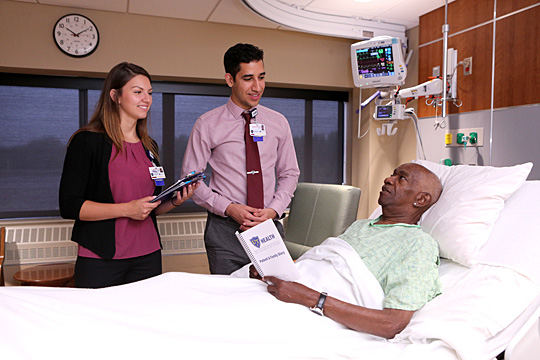This week, University of Toledo undergraduate and graduate student volunteers joined physicians, nurses and other health professionals as a part of a patient’s care team at The University of Toledo Medical Center.
Students pursuing a health-related career such as nursing, pre-med, pharmacy, social work or health-care administration began rounds as patient advocate assistants to provide a unique service to patients during their stay at UTMC.

Allison Gerren and Mahbod Pourriahi, UT patient advocate assistants, talked with UTMC patient Louis Turley during his recent hospital stay.
A part of the Service Excellence Department, the patient advocate assistant serves as a patient resource, answering questions, facilitating communication between patients and hospital staff, troubleshooting when challenges arise, and ensuring patients are comfortable while they are recovering in the hospital.
“Communication issues are the main criticism patients have with hospitals nationwide,” said Debra O’Connell, UTMC patient advocate. “This program will help improve two-way communication with our patients and their family members while providing a unique learning opportunity for UT students enrolled in various health-related careers.”
The field of health care is complex, and patients and their family members can find a hospital stay overwhelming.
“It’s not always easy for a patient to ask their physicians questions about their care, or they may think of something after the doctor has finished rounds,” said UT student Mahbod Pourriahi, a patient advocate assistant studying bioengineering. “That’s where we come in. We spend time visiting with the patients, understanding their concerns, and gathering any questions they may have for their health-care team.”
Patient advocate assistants also ensure patients are resting comfortably during their stay.
“We visit patients on their second day in the hospital,” said future UT medical student Allison Gerren, a patient advocate assistant. “I was expecting to meet patients who were sad or in a lot of pain, but instead I found patients smiling and laughing and happy to talk with me. It brightens my day, and I look forward to doing rounds.”
Ten students have completed the training program, and 15 additional students are entering phase two of training. The students will begin regular rounds within UTMC’s Cardiovascular Unit and Medical/Surgical Step-Down and Neurology units. There are plans to expand the program to other areas of the hospital as more students enter the program.
“The program is another way UTMC strives to provide excellent patient care while training future doctors, nurses, pharmacists and hospital administrators,” said Dustin Ballinger, nursing director in the UTMC Cardiovascular Unit. “This program provides another avenue for checking in on our patients and receiving their feedback.”
Students also benefit from the opportunity to build relationships with medical professionals, get real-world experience interacting with patients, and practice communication and customer service skills.
“We want each and every patient to know that they are our priority,” O’Connell said. “Patients and their families should feel comfortable with all decisions and plans that are made during their stay. We encourage patients to be more active during consultations with physicians. The goal of this program is to provide the best care possible for the patient.”
The students in the program said they have already learned from the training experience and are ready to begin visiting their own patient caseload.
“The training has really helped me to become more comfortable approaching and talking to people in need of care,” Pourriahi said. “I think working with patients now will make me a better and more receptive doctor in the future.”